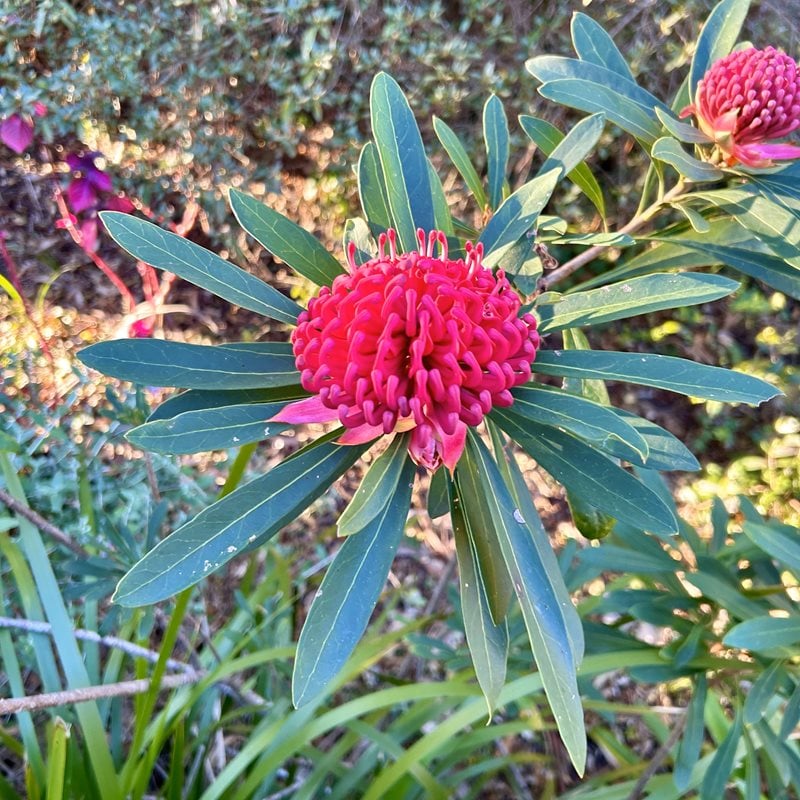
It might be the NSW dweller in me, but these blooms have always been my favourite, with their bright red anemone-like tendrils. Looking at these beautiful flowers – their name comes from the Eora Aboriginal word 'warada' meaning 'beautiful' – gives me a sense, however fleeting, of joy and levity.
Some Aboriginal Dreamtime stories believe that all waratah flowers were originally white. Then a female wonga pigeon was flying above the trees, looking for her lost mate when a hawk attacked her, and pierced her breast. She flew, and bled onto all the white waratahs, and her blood stained all the flowers red.
Why am I talking about flowers in an emergency medicine blog?
Waratahs are a pyrogenic flowering species. Pyrogenic flowering is when a plant has increased flowering, then production and dispersal of seeds that take advantage of improved growing conditions, after a fire. The waratah becomes more beautiful, and more expansive, after being burnt. What a powerful symbol of resilience!
I can imagine emergency departments as a pyrogenic species. I hope that this period of fire – workforce crisis, access block, overcrowding – is the heat that creates favourable growing conditions for more flowering and growth in our systems across Australia and Aotearoa New Zealand.
The waratah is also known to be a flower of hope, a beacon to offer the support and courage needed to survive, and thrive, through dark times – and I find this comforting.
What’s your favourite flower, and what does it symbolise? I asked some of our colleagues this question, and everyone had a quick and decisive answer. Our last President, Dr John Bonning, loves the Kōwhai flower – the bright yellow spring flower in Aotearoa. This is apt for Dr Bonning, as the flower is said to help people to move on from the past with a renewed sense of adventure!
Our next President, Dr Stephen Gourley loves the banksia flower. Again, this is accidentally symbolic, as this sunset-coloured bloom represents rebirth, new beginnings and discovery – and in six weeks, Dr Gourley will begin a chapter of his life, and of the College’s, as our next President.
The ceremony will be held as part of the ACEM Annual Scientific Meeting (ASM), running from the 19th to the 23rd November, in Canberra. I encourage you to register for the ASM, if you haven’t already.
This month, on the exact same day, large political events that will have real impact on the lives of the communities we serve, will be taking place.
On the 14th of October, Aotearoa New Zealand will hold its 2023 election – with early voting already underway. Regardless of the outcome, ACEM will continue to advocate for the needs of emergency clinicians and trainees in NZ, and for the communities they serve.
On the same day that New Zealand goes to the polls, Australians will also be voting. This time, in the referendum about whether to change the Constitution to recognise the First Peoples of Australia by establishing the Aboriginal and Torres Strait Islander Voice.
ACEM supports the Voice, as do I personally. I encourage you to read three pieces of writing by our colleagues and ACEM staff on this topic:
Please read the editorial written by the Co-Chair of ACEM's Indigenous Health Committee, Dr Glenn Harrison: A voice for Indigenous people: A clear and welcome path to self-determination and reconciliation, published in EMA this month.
Dr Liz Mowatt’s article in YourED, Tracing ACEM’s steps towards Reconciliation, researches and articulates the College’s journey in working towards equity in Australian EDs, and in our College.
Also in YourED, Gabby Ebsworth, a proud Wangkumara and Barkindji woman, and ACEM’s Indigenous Health Project Lead, has written a wonderful personal essay on the importance of embedding cultural safety at all levels of the health system: Cultural safety requires more than a red, black, and yellow cookie.
Until next month, please take care of yourselves and each other, and take a moment to admire your own favourite flower – or an equivalent for you that also sparks joy or levity, however fleeting.
As always, whatever the next month brings, we will get through it as we always do – together.
ACEM President
Dr Clare Skinner